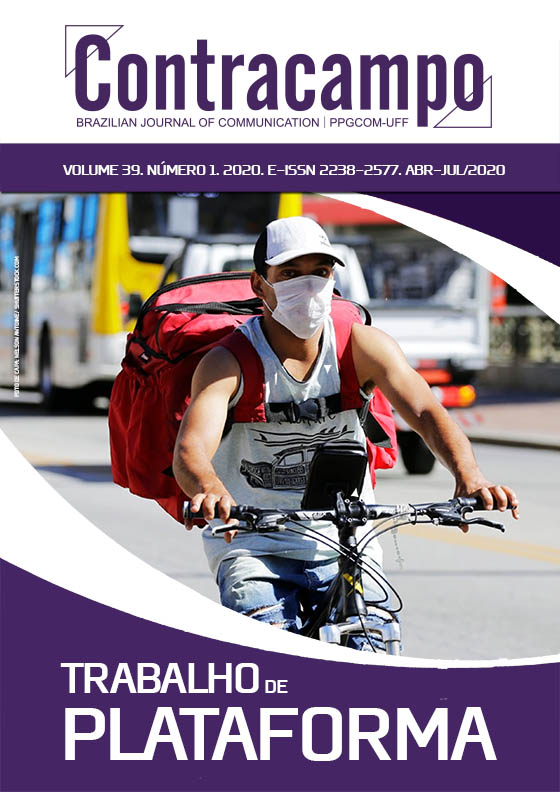Plataformas Digitais, Uberização do Trabalho e Regulação no Capitalismo Contemporâneo
DOI:
https://doi.org/10.22409/contracampo.v39i1.38901Parole chiave:
Plataformas, Trabalho, Regulação, Capitalismo.Abstract
O objetivo deste texto é analisar a relação entre trabalhadores/as e as “plataformas” e “aplicativos”, bem como as possibilidades de sua regulação, à luz do uso das novas tecnologias da informação e comunicação (TIC). Para tal, apresentamos os principais elementos da narrativa dominante das “plataformas”, contrapondo-os às evidências empíricas oriundas das relações estabelecidas. Ao contrário do ideário empresarial, estas relações são caracterizadas por uma intensa exploração do trabalho. Tecnicamente, nunca foi tão fácil regular o direito do trabalho. Porém, politicamente, talvez nunca tenha sido tão difícil. A narrativa sobre o que são essas empresas, joga papel importante na promoção dessa gestão precarizante, ainda que haja sinais de resistência dos trabalhadores a esse processo.
Downloads
Riferimenti bibliografici
ALIANÇA BIKE. (2019). Perfil dos entregadores ciclistas de aplicativo. Coord. Geral: Daniel Guth e Glaucia Pereira. In Aliança Bike [site], São Paulo: Associação Brasileira do Setor de Bicicletas, http://aliancabike.org.br/pagina.php?id_secao=10&id_page=50.
ANTUNES (2018), Ricardo. O privilégio da servidão: o novo proletariado de serviços na era digitaL, São Paulo, Boitempo
____________. Adeus ao trabalho? Ensaio sobre as metamorfoses e a centralidade do mundo do trabalho. São Paulo, Cortez, 1995.
____________. Os sentidos do trabalho. São Paulo, Boitempo, 1999.
____________; BRAGA, Ruy (orgs.). Infoproletários: degradação real do trabalho virtual. São Paulo, Boitempo, 2009.
ANTUNES (2019), Ricardo (org.). Riqueza e Miséria do Trabalho no Brasil (Trabalho digital, autogestão e expropriação da vida), vol. IV. São Paulo, Boitempo
BALARAM (2017), Brhmie; WARDEN, Josie; WALLACE-STEPHENS, Fabian. Good Gigs A fairer future for the UK’s gig economy. Disponível em: <https://www.thersa.org/discover/publications-and-articles/reports/good-gigs-a-fairer-future-for-the-uks-gig-economy>.
BASSO, Pietro. Tempos Modernos, Jornadas Antigas. Campinas, Ed. Unicamp, 2018.
BERG (2017), J; DE STEFANO, V. It´s time to regulate the gig economy. Sheffield Political Economy Research Institute. Disponível em: http://speri.dept.shef.ac.uk/2017/04/18/its-time-to-regulate-the-gig-economy/
BERG (2017). The inneficient technological revolution. International Labour Organization. ”VI Regulating for Decent Work Conference”.
CHESALINA, Olga (2017); Social security for platform economy as a challenge for social security in Germany and in Russia: a comparative study. Disponível em: https://e-revistas.uc3m.es/index.php/SLLERJ/article/view/4433
DAL ROSSO, Sadi (2017); O ardil da flexibilidade: os trabalhadores e a teoria do valor. São Paulo, Boitempo.
DE STEFANO, Valerio (2017); Labour is not a technology – reasserting the declaration of philadelphia in times of platform-work and gig-economy
DE STEFANO, Valerio. The rise of the "just-in-time workforce": on-demand work, crowdwork and labour protection in the "gig-economy". 2016. Geneva: ILO, 2016 Conditions of work and employment series; No. 71). Disponível em: http://www.ilo.org/wcmsp5/groups/public/---ed_protect/---protrav/---travail/documents/publication/wcms_443267.pdf
DYER-WITHEFORD, Nick. (2015) Cyber-Proletariat: Global Labour in the Digital Vortex. Londres, Pluto, 2015.
FARRELL (2016); GREIG. Paychecks, Paydays, and the Online Platform Economy Big Data on Income Volatility. 2016. Disponível em: https://papers.ssrn.com/sol3/papers.cfm?abstract_id=2911293
FILGUEIRAS, Vitor. (2013), “Novas/Velhas formas de organização e exploração do trabalho: a produção “integrada” na agroindústria”. Revista Mediações, 18: 230.
______________. (2016), “Regulação da terceirização e estratégias empresariais: o aprofundamento da lógica desse instrumento de gestão da força de trabalho”. Cadernos do CEAS, 239: 742-770.
______________; CAVALCANTE, Sávio (2020). What has changed: a new Farewell to the Working Class?. REVISTA BRASILEIRA DE CIÊNCIAS SOCIAIS.
GRAHAM, Mark; HJORTH, Isis; LEHDONVIRTA, Vili (2017); Digital labour and development: impacts of global digital labour platforms and the gig economy on worker livelihoods
HUWS (2013), Ursula. The Making of a Cybertariat: Virtual Work in a Real World. Londres, Merlin, 2003.
HUWS (2014), Ursula. Labor in the Global Digital Economy: the Cybertariat Comes of Age. Londres, Merlin.
ILO (2015), World employment and social outlook 2015: The changing nature of jobs / International Labor Office. Geneva, ILO.
IRLE (2017). Labor Platforms and Gig Work: The Failure to Regulate. IRLE Working Paper No. 106-17. http://irle.berkeley.edu/files/2017/Labor-Platforms-and-Gig-Work.pdf).
MANYKA (2016); LUND; BURGHIN; ROBINSON; MISCHKE; MAHAJAN. Independent work: choice, necessity, and the gig economy. Mckinsey intitute. Disponível em: https://www.mckinsey.com/featured-insights/employment-and-growth/independent-work-choice-necessity-and-the-gig-economy.
MARX (2013), Karl. O capital: crítica da economia política. Livro I. São Paulo: Boitempo.
MORAES, R. B. S.; OLIVEIRA, M. A. G.; ACCORSI, A. (2019) Uberização do trabalho: a percepção dos motoristas de transporte particular por aplicativo. Revista Brasileira de Estudos Organizacionais. v. 6, n. 3.
KITTUR (2013), Aniket Jeffrey V. NICKERSON, Michael S. BERNSTEIN, Elizabeth M. GERBER, Aaron SHAW, John ZIMMERMAN, Matthew LEASE, and John J. HORTON. The Future of Crowd Work. Disponível em: https://hci.stanford.edu/publications/2013/CrowdWork/futureofcrowdwork-cscw2013.pdf>
PARROT, James A; REICH, Michael (2018). Report for the New York City Taxi and Limousine Commission. Disponível em: https://static1.squarespace.com/static/53ee4f0be4b015b9c3690d84/t/5b3a3aaa0e2e72ca74079142/1530542764109/Parrott-Reich+NYC+App+Drivers+TLC+Jul+2018jul1.pdf
STANDING, Guy. (2011), The Precariat: The New Dangerous Class. London, Bloomsbury Academic.
STANDING, Guy. (2016), “A Revolt Is Coming for Cloud Labor”. Available in: http://www.huffingtonpost.com/guy-standing/cloud-labor-revolt_b_8392452.html. Consulted in: 0/05/2017
THE HAMILTON PROJECT (2015); A Proposal for Modernizing Labor Laws for Twenty-First- Century Work: The “Independent Worker”.
UH (2019). Platform Work in the UK 2016-2019, https://www.feps-europe.eu/attachments/publications/platform%20work%20in%20the%20uk%202016-2019%20v3-converted.pdf
VALENDUC, G. (2019). New form of work and employment in the digital economy. In: The Deconstruction of Employment as a Political Question, eds A. Serrano-Pascual and M. Jepsen (Brussels: Palgrave Macmillan), 63–80
WORLD BANK (2019). The changing nature of work. Disponível em: http://pubdocs.worldbank.org/en/816281518818814423/2019-WDR-Draft-Report.pdf
Pubblicato
Fascicolo
Sezione
Licenza
Os autores retêm os direitos autorais e concedem à revista o direito de publicar o seu trabalho pela primeira vez sob a licença Creative Commons (CC-BY), que permite o intercâmbio de obras e reconhecimento de autoria na revista.


